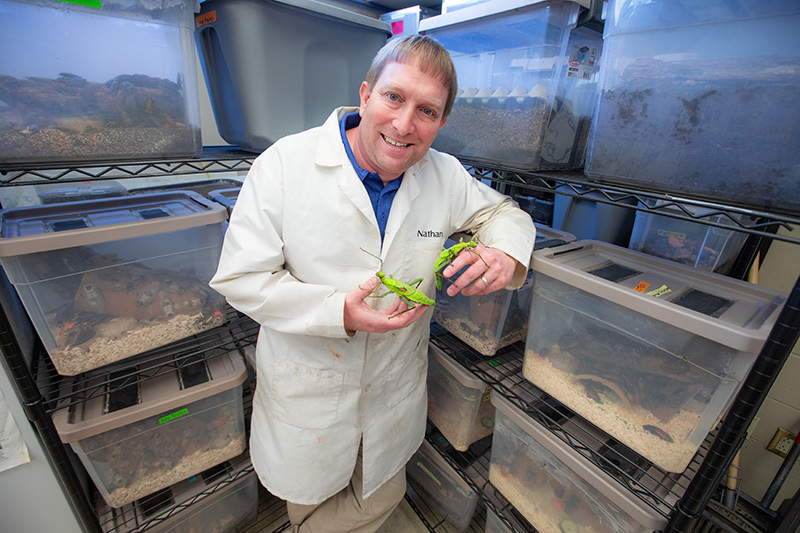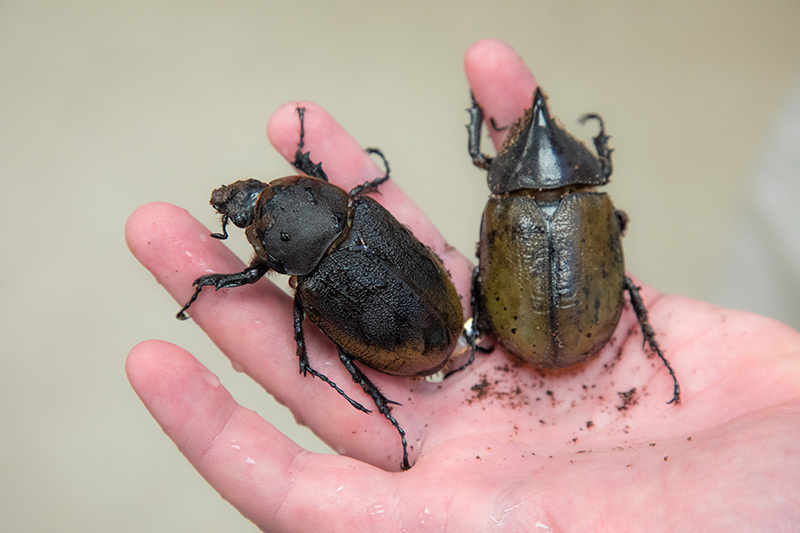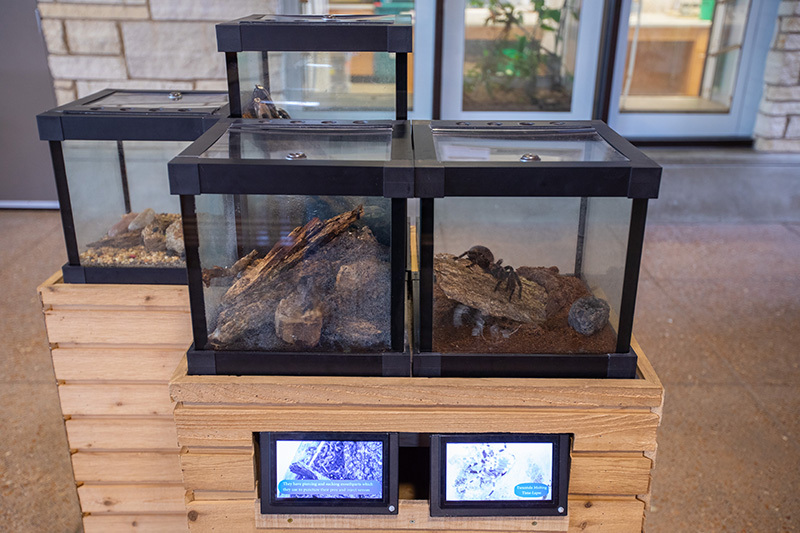
Reiman Gardens director of entomology Nathan Brockman holds a pair of female jungle nymphs next to other cases containing insects that will rotate through the new display cases in the lobby. Photos by Christopher Gannon.
It started with butterflies, but over the years Nathan Brockman grew Reiman Gardens' insect population, introducing some who move a little slower and others who spin a web.
"When Reiman first started, the emphasis was definitely on butterflies -- primarily only on butterflies -- and there was a push not to have any other invertebrates," said the gardens' director of entomology. "Over the years, I have added to the collection, with most of it coming from other institutions that had more than they could handle.
"Butterflies are a great gateway insect into the invertebrate world because they are something people don't even consider insects."
Enter the main doors of Reiman Gardens and just right of the information desk are insect display cases and some viewing windows where a group of walking sticks were hanging out one day in late February. Tucked away in a small room are more than 30 species of insects that include beetles, millipedes, isopods and tarantulas. Brockman's hope is that people who come for the butterflies take time to learn about other insects.
Learning is power
Brockman said the addition of insects to Reiman Gardens is a way to teach visitors about the many useful things they do while lessening fear of six-legged movers.

Reiman Gardens director of entomology Nathan Brockman holds a female, left, and male Hercules beetle inside the entomology lab.
"We have a lot of biology-based clubs that visit the lab and engage with the insects we have here," he said.
Brockman enjoys seeing children interact with the insects but gets more excited when that interest continues with high school and college visitors who are considering a major in entomology or related field. Ames High School takes advantage with its advanced biology class and the "Behind the Scenes" tour where students handle and interact with a variety of insects.
"We've had parents arrange a tour (during their campus tour) to give their students who may be interested in entomology an experience with invertebrates," Brockman said. "I enjoy sharing my passion with them, and it might lead them to pursue something in the field."
Collaboration
Brockman supervises students who work in the lab and in the butterfly wing. Graduate students and faculty conduct research, of which a recent project focused on butterfly flight. A makeshift wind tunnel was constructed in the lab.
Reiman Gardens also has a multidiscipline internship program that allows students to work in a variety of areas, including the insect lab. Strategic plan funds for fiscal year 2024 are ensuring internships remain available while Reiman Gardens recovers from the pandemic, including a summer internship dedicated to entomology.
"That funding has allowed us to keep the intern program at 10 students -- instead of having to significantly cut the number -- and they have rotations where they can intern in different departments to understand all aspects of public garden operations, including entomology," said Reiman Gardens director Ed Lyon. "Our interns also get the opportunity to go on two local and one overnight tour related to public gardens, the green industry or education. This helps broaden their horizons beyond the gardens themselves."
Brockman assists the Insect Zoo, based in the plant pathology, entomology and microbiology department, as needed. That outreach program also is important to him because he was one of the first students to work with it as an undergraduate.
"We also partner with the entomology department for a variety of things like Pollinator Fest in June and the Day of Insects in March," Brockman said. "Being the university's public garden allows us to have discussions about pollinators, which is more than just honeybees. The number of flies, beetles and butterflies that are doing pollinating work is important."
New student opportunities
Reiman Gardens currently has a collection of custom-duty seizure tarantulas.
"We are one of the few facilities in the nation that will take insects that are illegally smuggled into the country," Brockman said. "When smuggline happens, the U.S. Fish and Wildlife Service can either destroy them all or find them a home that keeps them out of the pet trade."
To expose more veterinary students to invertebrate care, Brockman worked with veterinary clinical sciences clinical assistant professor June Olds. Students in the "Wildlife Medicine" and "Exotic Pet Medicine" courses took home 33 tarantulas in February to care for them. Brockman hopes it will lead to more students feeling comfortable enough to treat invertebrates -- a specialty in short supply around the nation.
"It allowed them to observe and care for the tarantulas, and they are able to share their experiences with us," he said. "Hopefully, this is something we can do in future years."

The new insect display cases in the Reiman Gardens lobby.

